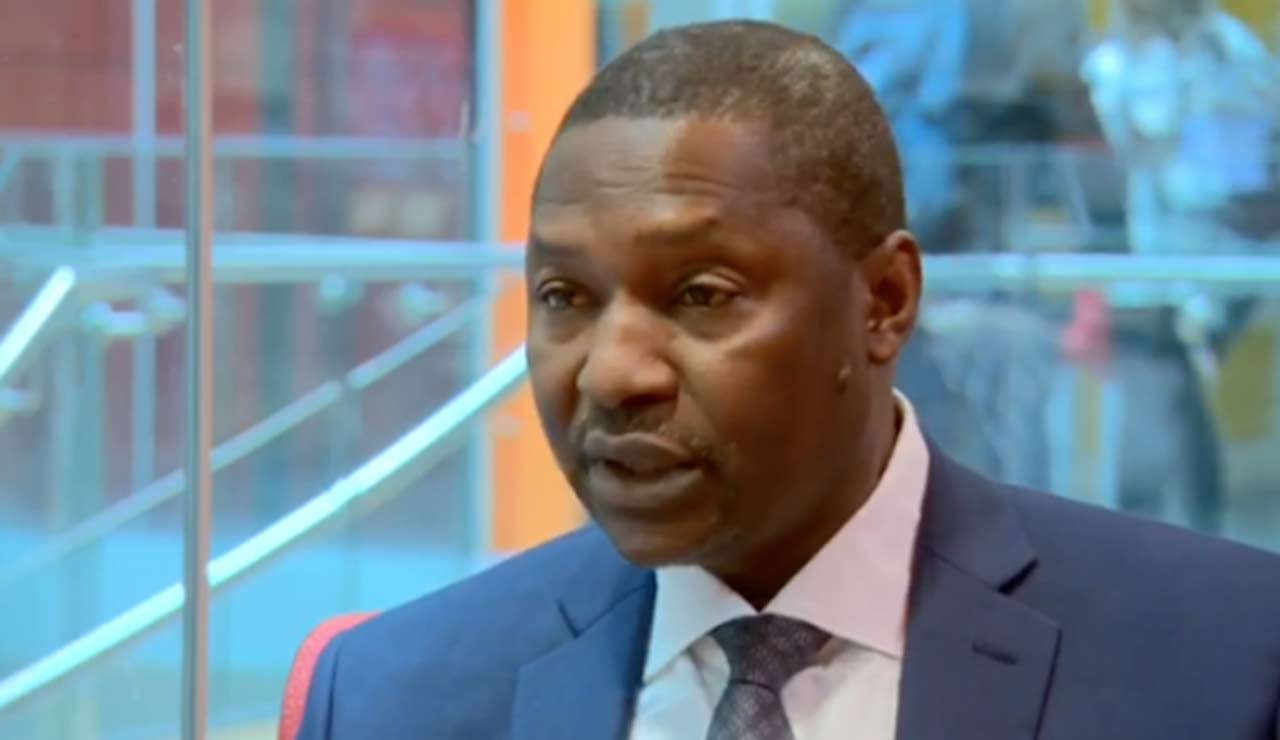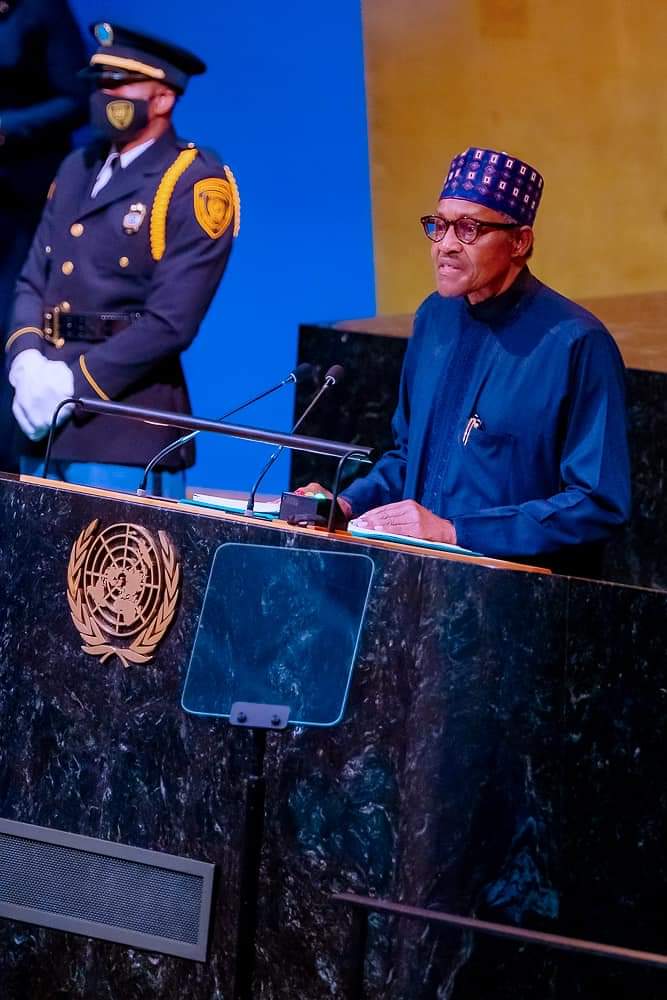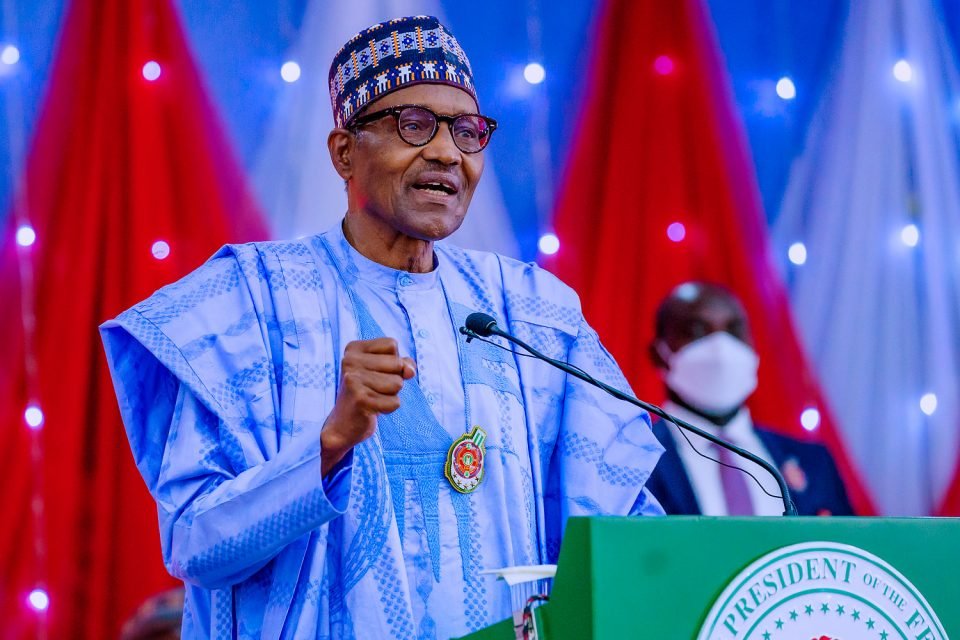President Muhammadu Buhari on Monday morning returned to Abuja, after a successful participation in the 77th session of the high-level meetings of the UN General Assembly in New York, United States.
Newsmen reports that the presidential jet conveying the president and other members of the entourage landed at the Presidential wing of the Nnamdi Azikiwe International Airport Abuja at about 6.25 a.m.
While in New York, President Buhari participated in no fewer than 12 High level events, including bilateral meetings.
Buhari attended the opening of Transforming Education Summit on Sept 19 ahead of the General Debate and attended Leaders Roundtable segment of the Summit where he delivered Nigeria’s statement.
The Nigerian leader was also the first speaker, on Wednesday, to deliver Nigeria’s statement to the world leaders, assuring them of leaving lasting legacies and restated commitment to constitutional term.
He told the global body that his administration was determined to entrench a process of free, fair, transparent and credible elections through which Nigerians would elect their leaders.
The president also engaged in various bilateral talks with some world leaders on the margins of the 77th Session of the UN General Assembly.
He also alerted the world leaders on the danger of escalation of the war in Ukraine, saying the conflict further justified Nigeria’s resolute calls for a nuclear-free world and a universal Arms Trade Treaty.
Buhari said the call had become necessary to prevent global human disasters.
He, therefore, demanded that world leaders must find quick means to reach consensus on the nuclear non-proliferation Treaty with related commitments by nuclear weapon states.
The president also at the Nigeria International Economic Partnership Forum held on the margins of the UNGA77 in New York on Sept. 22, expressed delight that Nigeria’s investments in improving security were yielding fruitful results.
He, therefore, lauded the Nigeria military for making significant progress in the fight against insecurity and building the momentum in reducing challenges to its barest minimum.
Buhari also spoke at a ‘Leaders’ Closed-Door Meeting on Climate Change’ convened by the Secretary General of the United Nations, Mr Antonio Guterres.
He restated the commitment of the Nigerian government towards ensuring a rapid and strategic transition to renewable energy.
He said this would be in response to the world-wide efforts for the preservation of the environment.
Also at a meeting with the Business Council for International Understanding (BCIU) at the Nigeria International Economic Partnership Forum on Sept. 23, Buhari described the United States as Nigeria’s main trading partner and one of ‘‘our most important diplomatic partners’’.
This, he said, underscored the need for concerted efforts to increase the volume of bilateral trade.
The Nigerian leader told the gathering that in 2020, Nigeria exported more than $1.69 billion worth of goods to the U.S., adding that these exports were primarily made up of crude oil and other petroleum products.
Buhari also held bilateral talks with the President of Palestine, Mahmoud Abbas, in New York on Wednesday, where he called on African countries and their Arab partners to work hard and be more united to realise common objectives.
He said the actualisation of the UN resolution, which proposed a two-state solution to the crisis between Israel and Palestine, required a platform to think creatively on how to engage the rest of the world on the matter.
The president also engaged in various bilateral talks with some world leaders on the margins of the 77th Session of the UN General Assembly.
At a meeting with the Prime Minister of Greece, Kyriakos Mitsotakis, Buhari urged for a closer partnership with Nigeria in education, health, security, and non-oil and gas sectors.
While stressing the importance of education and knowledge, he said the time had come to begin to look at practical ways of tackling health challenges coming without notice.
The president also on Friday in New York called for more private sector participation in the humanitarian sector in Nigeria.
Buhari made the call against the backdrop of lingering challenges posed by the COVID-19 pandemic, catastrophic weather events and conflicts.
The Nigerian leader also stressed the need for efficient collaboration among stakeholders involved in humanitarian action and disaster mitigation in the country.
Buhari at a High-Level side event on ”Food Security Response: Combating Illicit Financial Flows and Securing Asset Returns for Sustainable Development’‘, urged African leaders to fight tirelessly to get rid of corruption.
The president, who spoke in his capacity as the African Union Champion on efforts to eliminate corruption on the continent, lamented that the continent had remained at the far end of global development index because of its menace.
The event, held at the margins of UNGA77 on Sept. 24, was co-hosted by African Union Development Agency-New Partnership for Africa’s Development (AUDA-NEPAD) and the Economic and Financial Crimes Commission (EFCC).
While providing his perspectives on the effects of corruption on the continent and the way forward, the Nigerian leader said he was honoured to serve as AU Champion on anti-corruption since 2018.
Buhari also on Friday inaugurated Nigeria’s Integrated National Financing Framework (INFF) for Sustainable Development.



